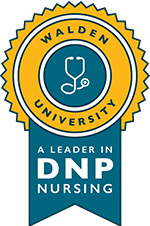We are here to help you find your nursing practicum.
PROGRAM SAVINGS
Choose the Path That Is Right for You
Choose the BSN to DNP track if you are a registered nurse (RN) and have earned your bachelor’s in nursing degree.
Choose the MSN to DNP track if you are a registered nurse (RN) and have earned your master’s in nursing degree.
Curriculum
Minimum Completion Requirements
-
90 quarter credits
-
Doctoral Writing Assessment (0 cr.)
-
Foundation course (5 cr.)
-
Essential courses (10 cr.)
-
Core courses (40 cr.)
-
Specialization courses (35 cr.)
-
Completion of DNP project
-
Doctoral Mentoring (0 cr.)
-
Doctoral DNP Project Completion (if needed to complete DNP Project after all other coursework has been completed; 3 cr. per term, taken continuously until completion)
-
-
View the COMPLETE CURRICULUM PLAN.
Curriculum
Minimum Completion Requirements
-
80 quarter credits
-
Doctoral Writing Assessment (0 cr.)
-
Foundation course (5 cr.)
-
Core courses (40 cr.)
-
Specialization courses (35 cr.)
-
Completion of DNP project
-
Doctoral Mentoring (0 cr.)
-
Doctoral DNP Project Completion (if needed to complete DNP Project after all other coursework has been completed; 3 cr. per term, taken continuously until completion)
-
-
View the COMPLETE CURRICULUM PLAN.
Personalized Practicum Support
Practicums are vital to your learning experience. That’s why we offer Practicum Advantage™—an ensemble of resources, self-help tools, and staff who understand the challenges of completing the nursing practicum. This includes the Walden Practicum Pledge™, available for MSN-NP and DNP-NP specializations. Once you register, a dedicated Field Placement Team partners with you to secure a site and preceptor. If you can’t identify your site and preceptor (along with additional requirements*), we’ll help find you a match.
Explore Real-Life Clinical Scenarios With Walden Grand Rounds
As a nurse practitioner student at Walden, you can take part in Walden Grand Rounds several times throughout the quarter. Meet virtually with faculty and classmates to review clinical patient scenarios that are focused on assessing, differentiating, and treating pathological conditions. This is a unique opportunity to connect what you’ve learned in class with real-life situations and challenges you’ll encounter in the field as an NP.
Admission Requirements
Program Admission Considerations (BSN-DNP track): You must have a current, active RN license, a Bachelor of Science in Nursing or equivalent from an accredited school and meet the general admission requirements.
Program Admission Considerations (MSN-DNP track): You must have a current, active RN license, a Master of Science in Nursing or equivalent from an accredited school and meet the general admission requirements.
General Admission Requirements: Completed online application and transcripts.
- The Technical Standards Policy Form, a statement of understanding of the DNP NP practicum requirements.
- Additional Walden admission criteria required. Contact an Enrollment Specialist for more details.
- More information for international applicants.
| Curriculum | Requirements | Cost | AMOUNT * | |
|---|---|---|---|---|
| Tuition-Coursework | 45 quarter credits | $905 per quarter hour for coursework credits | $40,725^ | |
| Tuition – Essential coursework | 10 quarter credits | $495 per quarter credit | $4,950^ | |
| Tuition – NP Specialization coursework | 35 quarter credits | $765 per quarter credit | $26,775^ | |
| Clinical course fee | 4 courses (PRCM) | $160 per course | $640 | |
| Tuition-Doctoral Study/Project | 0–57† quarter credits | $905 per quarter hour for doctoral study/project credits | Up to $51,585 | |
| Program Fee | $175 per quarter | 2,275–$5,600* | ||
| Estimated Range: | 3.25-Year Minimum | 8-Year Maximum | ||
| $75,365 | $130,275+ | |||
These are ranges of what a student can expect in terms of time and tuition cost to complete a degree. It does not include other fees, nor is it adjusted for tuition increases over time. Walden faculty has concluded that generally students who do not complete their program in eight years are unlikely to complete and only allow students to exceed that time frame when a student petitions for an extension and provides good reason for the delay and assurances that obstacles to completion can be overcome. Time is calculated using the time allowed for each semester or unit that the student completes. Students are encouraged to work continuously during the program so as not to extend the time needed to complete the degree as work can become stale and students lose focus. Students who earn two grades of “Unsatisfactory,” who repeatedly drop a course before a semester or unit has been completed, or are unable to complete in the eight year time frame, should expect that they may be dismissed from the program. Walden believes that it is in the best interest of a student who is unable to complete the degree in the stated ranges to strongly consider withdrawal or obtaining a lesser degree.
Time to completion and cost are not estimates of individual experience and will vary based on individual factors applicable to the student. Factors may be programmatic or academic such as tuition and fee increases and/or the student’s transfer credits accepted by Walden; program or specialization changes; unsuccessful course completion; credit load per term; writing, research and editing skills; use of external data for their doctoral study/dissertation; and/or individual progress in the program. Other factors may include personal issues such as the student’s employment obligations; care giving responsibilities or health issues; part-time vs. full-time enrollment; leaves of absence; and/or other personal circumstances.
Tuition and fees are subject to change. Books and materials are not included. Students may incur additional costs for remedial writing assistance, if necessary.
^This assumes students successfully complete their coursework on the first attempt.
† Based on a 3.25-year minimum completion requirement and an 8-year maximum timeframe as outlined in Walden academic policy.
*Tuition and fees will be higher if students petition to extend the 8-year maximum timeframe or choose to take more expensive elective courses.
+Tuition and time to complete may be reduced if transfer credits are accepted, or if you receive grants, scholarships or other tuition discounts. For a personalized estimate of the number of your transfer credits that Walden would accept, call an Enrollment Specialist at 844-768-0109.
| Curriculum | Requirements | Cost | AMOUNT* | |
|---|---|---|---|---|
| Tuition-Coursework | 45 quarter credits | $905 per quarter hour for coursework credits | $40,725^ | |
| Tuition – NP Specialization coursework | 35 quarter credits | $765 per quarter hour | $26,775^ | |
| Clinical course fee | 4 courses (PRCM) | $160 per course | $640 | |
| Tuition-Doctoral Study/Project | 0–60† quarter credits | $905 per quarter hour for doctoral study/project credits | Up to $54,300 | |
| Program Fee | $175 per quarter | $1,925–$5,600* | ||
| Estimated Range: | 3-Year minimum | 8-Year maximum | ||
| $70,065 | $128,040+ | |||
These are ranges of what a student can expect in terms of time and tuition cost to complete a degree. It does not include other fees, nor is it adjusted for tuition increases over time. Walden faculty has concluded that generally students who do not complete their program in eight years are unlikely to complete and only allow students to exceed that time frame when a student petitions for an extension and provides good reason for the delay and assurances that obstacles to completion can be overcome. Time is calculated using the time allowed for each semester or unit that the student completes. Students are encouraged to work continuously during the program so as not to extend the time needed to complete the degree as work can become stale and students lose focus. Students who earn two grades of “Unsatisfactory,” who repeatedly drop a course before a semester or unit has been completed, or are unable to complete in the eight year time frame, should expect that they may be dismissed from the program. Walden believes that it is in the best interest of a student who is unable to complete the degree in the stated ranges to strongly consider withdrawal or obtaining a lesser degree.
Time to completion and cost are not estimates of individual experience and will vary based on individual factors applicable to the student. Factors may be programmatic or academic such as tuition and fee increases and/or the student’s transfer credits accepted by Walden; program or specialization changes; unsuccessful course completion; credit load per term; writing, research and editing skills; use of external data for their doctoral study/dissertation; and/or individual progress in the program. Other factors may include personal issues such as the student’s employment obligations; care giving responsibilities or health issues; part-time vs. full-time enrollment; leaves of absence; and/or other personal circumstances.
Tuition and fees are subject to change. Books and materials are not included. Students may incur additional costs for remedial writing assistance, if necessary.
^This assumes students successfully complete their coursework on the first attempt.
†Based on a 2.7.5 -year minimum completion requirement and an 8-year maximum timeframe as outlined in Walden academic policy.
*Tuition and fees will be higher if students petition to extend the 8-year maximum timeframe or choose to take more expensive elective courses.
+Tuition and time to complete may be reduced if transfer credits are accepted, or if you receive grants, scholarships or other tuition discounts. For a personalized estimate of the number of your transfer credits that Walden would accept, call an Enrollment Specialist at 844-768-0109.
Paying for Your Education
Our Enrollment Specialists can help you outline a plan and find resources for funding your education.
PROGRAM SAVINGS
Program Outcomes
Deliver an Advanced Level of Critical Care
Learn to plan, implement, and evaluate care for critically ill patients in our online DNP adult-gerontology acute care program. In this specialization, you’ll explore how to perform diagnostic and therapeutic interventions during rapid physiologic deterioration or life-threatening instability. Master essential skills in health promotion and disease prevention by assessing risks and providing wellness education to vulnerable patient populations.
Walden practicum coordinators are available to assist you in meeting your practicum requirements. Explore our FAQ document for answers to some of the most common questions.
Career Outlook
The demand for nurse practitioners in acute-care settings is rising, as an aging and expanding population strains our nation’s healthcare system. An online DNP adult gerontology acute care degree can qualify you to help meet the demand and broaden your career opportunities.
According to the U.S. Bureau of Labor Statistics, job openings for nurse practitioners are expected to grow by 52% through 2030.2 The average median pay for a nurse practitioner is $111,680 per year; however, the salary range typically falls between $82,960 and $156,160.3 Salary ranges can vary widely depending on many factors, including education, certifications, additional skills, and the number of years you have spent in your profession.
A DNP-AGACNP degree can academically prepare you to work in settings such as:
- Emergency departments and trauma centers
- Intensive care units
- Trauma centers
- Tertiary care, coronary care, and palliative care
- Specialty care centers
- Hospital surgical units, including general, cardiovascular, and neurosurgery
Career options may require additional experience, training, or other factors beyond the successful completion of this degree program.
1Additional requirements for Walden's Practicum Pledge™
2Source: Bureau of Labor Statistics, Occupational Outlook Handbook, Nurse Anesthetists, Nurse Midwives, and Nurse Practitioners, SOC Code 29-1171. Retrieved September 2021. National job growth projections may not reflect local and/or short-term economic or job conditions, do not guarantee job growth, and are subject to change.
3Source: Bureau of Labor Statistics, My Next Move, Nurse Practitioners (SOC code 29-1171). Retrieved April 2021. National salary estimates may not reflect local and/or short-term economic or job conditions, do not guarantee actual salaries, and are subject to change.
Commission on Collegiate Nursing Education (CCNE)
The baccalaureate degree program in nursing (BSN), master’s degree program in nursing (MSN), post-graduate APRN certificate program, and Doctor of Nursing Practice (DNP) program at Walden University are accredited by the Commission on Collegiate Nursing Education (www.ccneaccreditation.org).
Note on licensure:
The DNP nurse practitioner specializations programs are designed to prepare graduates with an active registered nurse (RN) license or APRN license to practice in the U.S. as nurse practitioners in their program specialty area. However, each state has its own academic preparation and authority to practice requirements and issues its own credential for an RN to be permitted to practice as a nurse practitioner in that state.
No graduate program can guarantee that graduates will obtain licensure to practice as a nurse practitioner. We encourage students to consult the appropriate board of nursing or regulatory authority in the states or jurisdictions in which they reside or intend to seek licensure to determine specific requirements. Walden Enrollment Specialists can provide general information relating to licensure; however, it remains the individual’s responsibility to understand, evaluate, and comply with all requirements relating to licensure for the state in which they intend to practice, as requirements vary widely.
Note on certification:
Walden’s DNP NP specializations are designed to academically prepare graduates to apply for national certification. Walden makes no representations or guarantees that completion of Walden coursework or programs will permit an individual to achieve national certification. We encourage students to consult an appropriate certifying body for the specific certification eligibility requirements. Students should also consult their state board of nursing or other state agency to determine what certifications are required or accepted in that state. It is an individual’s responsibility to understand, evaluate, and comply with all requirements relating to national certification, as requirements vary widely. For more information about nurse practitioner certification exams, students should visit the American Academy of Nurse Practitioners Certification Board at www.aanpcert.org, the American Nurses Credentialing Center at www.nursingworld.org/ancc, or other nurse practitioner certification websites.
Enrollment Restrictions by State
Walden currently cannot enroll residents of the following states/districts into any DNP Nurse Practitioner specializations: Arizona, Louisiana, Nevada, New York, Oklahoma, Oregon, Rhode Island.
Note on Field Experience and Relocating
Students who are considering relocating are advised to contact their Student Success Advisor prior to any decision to relocate in order to determine how relocation may impact progress in their program. Advisors can provide information and guidance on how relocating may result in possible changes, restrictions, and/or additional requirements affecting field experience. Each Board of Nursing and Higher Education Authority governs the field experience rules and regulations in their respective states, and students may be unable to complete field experience in the state in which they plan to relocate. While Walden is committed to working collaboratively with students to secure field sites across the United States, it is imperative that students contact their Student Success Advisor immediately when considering relocating.










